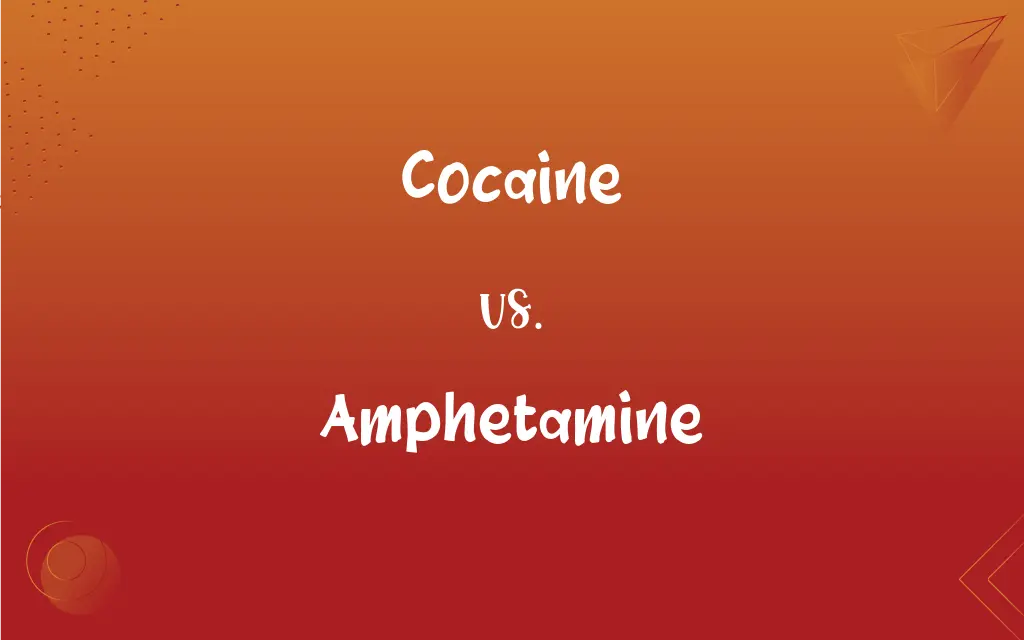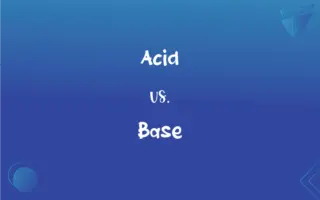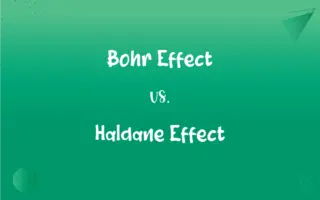Cocaine vs. Amphetamine: What's the Difference?
Edited by Aimie Carlson || By Harlon Moss || Updated on October 14, 2023
Cocaine is a powerful stimulant drug derived from the coca plant, known for its euphoric effects. Amphetamine is a synthetic stimulant that affects the central nervous system, often prescribed medically but also abused recreationally.

Key Differences
Cocaine, primarily derived from the coca plant, has a long history, often linked to its native South America. Contrarily, amphetamine, a synthetic substance, doesn’t derive from a plant and was initially developed in the late 19th century as a nasal decongestant and later recognized for its stimulating effects.
Use of cocaine often involves snorting the white powdery substance, but it can also be ingested or applied to mucous membranes. Amphetamine, on the other hand, may be orally ingested, particularly in its legitimate medicinal forms, such as in the treatment of ADHD, or taken illicitly in various ways.
In the context of illegality and abuse, cocaine is frequently associated with short, intense highs and is often connected to lavish or party lifestyles in popular media. Conversely, amphetamine is sometimes associated with prolonged periods of alertness and has been abused by individuals in various professions seeking to stave off fatigue.
When discussing legality and medical use, cocaine has very limited application, occasionally used in medical settings as a local anesthetic in certain surgeries. Amphetamine, however, holds broader medicinal applications, notably in treating Attention Deficit Hyperactivity Disorder (ADHD) and narcolepsy.
It is vital to note that both cocaine and amphetamine are classified as Schedule II drugs in the United States, indicating a high potential for abuse despite some medical applicability. The illegal possession, distribution, or manufacturing of either substance is met with severe legal penalties.
ADVERTISEMENT
Comparison Chart
Origin
Derived from the coca plant.
Synthetically manufactured.
Medical Use
Rarely used medically as a local anesthetic.
Commonly prescribed for ADHD, narcolepsy.
Common Form
Often a white powder.
Can be pills or a powder.
Duration of Effects
Typically short-lived, intense effects.
Longer-lasting stimulating effects.
Cultural/Media portrayal
Often associated with a party lifestyle.
Sometimes linked to staying awake/alert.
ADVERTISEMENT
Cocaine and Amphetamine Definitions
Cocaine
A substance occasionally used medically as a local anesthetic.
The surgeon utilized cocaine during the procedure to numb the area.
Amphetamine
A substance that can increase heart rate and feelings of alertness.
Some students misuse amphetamine to stay awake while studying.
Cocaine
A drug often associated with euphoric effects.
He was arrested for driving under the influence of cocaine.
Amphetamine
A controlled substance also abused recreationally.
The illegal market for amphetamine continues to be a global issue.
Cocaine
A controlled substance with a high potential for abuse.
Programs aim to educate youth about the dangers of cocaine.
Amphetamine
A synthetic, powerful central nervous system stimulant.
Amphetamine was originally developed as a decongestant.
Cocaine
A white, crystalline tropane alkaloid.
The lab tested the substance and confirmed it was cocaine.
Amphetamine
A drug often prescribed to manage ADHD and narcolepsy.
The doctor prescribed an amphetamine to address her ADHD.
Cocaine
A stimulant drug derived from the coca plant.
Cocaine is illegal in many countries due to its addictive nature.
Amphetamine
A compound with various derivative forms, like methamphetamine.
Different forms of amphetamine can vary in potency and effects.
Cocaine
A colorless or white crystalline alkaloid, C17H21NO4, extracted from coca leaves, sometimes used in medicine as a local anesthetic especially for the eyes, nose, or throat and widely used as an illicit drug for its euphoric and stimulating effects.
Amphetamine
A synthetic compound, C9H13N, that occurs as a racemic mixture of two stereoisomers or as one of its stereoisomers (especially dextroamphetamine), derivatives (such as methamphetamine), or salts. Amphetamine acts as a central nervous system stimulant, and various formulations are used in the medical treatment of certain conditions (such as attention deficit hyperactivity disorder) and illegally as stimulants.
Cocaine
An addictive drug derived from coca (Erythroxylum) or prepared synthetically, used sometimes medicinally as a local anesthetic and, often illegally, as a stimulant.
Amphetamine
The racemic freebase of 1-phenylpropan-2-amine; an equal parts mixture of levoamphetamine and dextroamphetamine in their pure amine forms.
Cocaine
(countable) Any derivative of cocaine.
Amphetamine
(informal) Any mixture of the two amphetamine enantiomers, dextroamphetamine and levoamphetamine.
Cocaine
A powerful narcotic alkaloid, C17H21NO4, obtained from the leaves of coca. It is a bitter, white, crystalline substance, and is remarkable for producing local insensibility to pain. It is classified as addictive and is not available in the U. S. without a prescription, but is nevertheless one of the most widespread illegal drugs of abuse. It is used in several forms, including small pellets of free base, called crack. Most of the cacaine illegally used in the U.S. is imported.
Amphetamine
Referring to a substituted amphetamine; a member of the amphetamine class of chemicals.
Cocaine
A narcotic (alkaloid) extracted from coca leaves; used as a surface anesthetic or taken for pleasure; can become powerfully addictive
Amphetamine
A potent central nervous system stimulant of the phenethylamine chemical class that is used to treat ADHD, narcolepsy, and obesity.
Amphetamine
A central nervous system stimulant that increases energy and decreases appetite; used to treat narcolepsy and some forms of depression
FAQs
Is it legal to possess cocaine or amphetamine without a prescription?
No, possession of cocaine or amphetamine without a prescription is illegal.
Can amphetamine be used medically?
Yes, amphetamine is medically used, particularly in treating ADHD and narcolepsy.
Is cocaine a natural or synthetic substance?
Cocaine is a natural substance derived from the coca plant.
How are cocaine and amphetamine consumed?
Cocaine is often snorted, while amphetamine can be orally ingested, snorted, or, in some forms, smoked or injected.
How do cocaine and amphetamine affect the brain?
Both substances increase levels of neurotransmitters in the brain, but they do so through different mechanisms and affect different neurotransmitters to varying degrees.
Are there any medical uses for cocaine?
Yes, cocaine is occasionally used in medical settings as a local anesthetic, particularly in some eye, ear, and throat surgeries.
Are there health risks associated with prolonged use of cocaine or amphetamine?
Prolonged use of either substance can result in numerous health issues, including heart problems, respiratory issues, and cognitive impairments.
What is the legal status of cocaine and amphetamine in the United States?
In the U.S., both cocaine and amphetamine are classified as Schedule II drugs, indicating they have some medical use but also a high potential for abuse.
Can the use of cocaine and amphetamine lead to overdose?
Yes, using excessive amounts of either cocaine or amphetamine can result in overdose, with potentially fatal consequences.
Is it dangerous to mix cocaine and amphetamine with other substances?
Absolutely, combining either cocaine or amphetamine with other substances, including alcohol, can be extremely dangerous and increase the risk of adverse reactions.
How are addictions to cocaine and amphetamine typically treated in a medical setting?
Treatment might include behavioral therapy, support groups, and in some instances, medication to manage withdrawal and cravings.
What is crack cocaine, and how does it differ from powdered cocaine?
Crack cocaine is a form of freebase cocaine that can be smoked, providing a short, intense high, while powdered cocaine is often snorted and has slightly different effects and duration.
Can cocaine and amphetamine be detected in a drug test?
Yes, both cocaine and amphetamine can be detected through various drug testing methods, including urine, hair, and blood tests.
Are there short-term health risks to using cocaine or amphetamine?
Yes, even short-term use of cocaine or amphetamine can lead to heart issues, neurological effects, and, in some cases, overdose.
Is the usage of cocaine and amphetamine prevalent among youth?
Cocaine and amphetamine usage is a concern among various age groups, including youth, where usage rates can fluctuate due to various factors.
Can both cocaine and amphetamine cause addiction?
Yes, both cocaine and amphetamine have high potential for abuse and can lead to addiction.
Can use of cocaine and amphetamine impact mental health?
Yes, usage of either substance can lead to adverse mental health effects, including anxiety, paranoia, and other disorders.
What role do cocaine and amphetamine play in global illicit drug trade?
Cocaine and amphetamine are significant components of the global illicit drug trade, with intricate networks dedicated to their manufacture, distribution, and sale.
Are cocaine and amphetamine illegal in all countries?
While regulations might vary, cocaine and amphetamine are controlled and often illegal substances in numerous countries worldwide.
Are there treatments available for addiction to cocaine or amphetamine?
Yes, treatments, including behavioral therapies and support groups, are available for managing addiction to both substances.
About Author
Written by
Harlon MossHarlon is a seasoned quality moderator and accomplished content writer for Difference Wiki. An alumnus of the prestigious University of California, he earned his degree in Computer Science. Leveraging his academic background, Harlon brings a meticulous and informed perspective to his work, ensuring content accuracy and excellence.
Edited by
Aimie CarlsonAimie Carlson, holding a master's degree in English literature, is a fervent English language enthusiast. She lends her writing talents to Difference Wiki, a prominent website that specializes in comparisons, offering readers insightful analyses that both captivate and inform.






































































